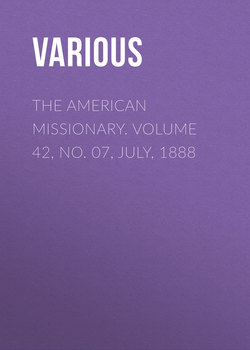Читать книгу The American Missionary. Volume 42, No. 07, July, 1888 - Various - Страница 3
THE INDIAN PROBLEM
ОглавлениеA good deal of ingenious ciphering has been done in endeavoring to solve this problem, and, withal, there has been a good deal of honest and efficient work. The Government has largely increased its appropriations from year to year, the Dawes Bill and other valuable legislation have been secured, so that steps looking towards the citizenship of the Indian have been attained. Appropriations have been granted to aid him in farming and other industrial pursuits, and it is not unlikely that in a short time provision will be made for the education in the common English branches of every Indian child.
But all this is not sufficient. The Indian may have lands and citizenship and an English education, and yet, if he has no strong impulse towards civilization, no motive in his heart impelling him to be an industrious, self-supporting citizen—in short, if he has not a new heart looking to a new life as a citizen and a man, he will become a vagabond on the land granted him, and a skeptic in the school in which he is taught. The next few years will constitute a crisis in the rapidly changing condition of the Indian, and it is precisely at this point where the vital element of the Christian life must be infused into his character. To the Christian public, all other questions subordinate themselves to this, and this needs, not speculation, but hard work; legislation cannot do it, the church must; time will not do it, Christian teaching and example alone can. The vernacular question, so much agitated recently, is important only as it may hinder this practical work.
The Indian problem is not perpetual. The Indian must soon be merged into the American, and whether this shall be for good or for ill, the church must decide, and decide speedily. We trust, therefore, that our constituents will aid us to extend, as rapidly as possible, that part of the work entrusted to us. We do not ask for expensive buildings or costly plant. We ask for the means to push forward with the teacher and the preacher among these uncivilized people till, when they come forth from their present anomalous condition, they shall come forth practical Christians, as well as intelligent and industrious citizens.
AN OUTRAGE
Prof. G.W. Lawrence, teacher of our school at Jellico, Tenn., a gentleman of quiet and unobtrusive manners, was brutally assaulted by a man of that place, and was shot in three places; one ball entered the wrist and followed up the arm, coming out near the shoulder, a second went into the back of the shoulder, and a third is probably lodged in the lungs. The assault occurred May 18th, in the church in which Mr. Lawrence was holding the school, in the presence of his wife and scholars. The only provocation alleged, was that he had gone the night before to ask for the tuition of one of his scholars. He was met in an angry way by the woman, and the next day the husband, who does not live with his wife, came to the school and fired the shots. Prof. Lawrence is the brother-in-law of our highly esteemed and active Christian worker, Rev. A.A. Myers, who has not only done so much in promoting school and church work in Kentucky and Tennessee, but who has also been so zealous in promoting the cause of temperance. Prof. Lawrence sympathized and co-operated with Mr. Myers in this good work, and it is believed that liquor and liquor influence had much to do in inspiring the deed. As all the parties in this transaction were white, it is not at all probable that the color-line question had anything to do with it.
The community was moved with intense indignation, and the assassin was speedily taken to the county jail to escape a lynching. A large meeting was subsequently held in the Baptist Church, and a committee was appointed to prosecute the perpetrator. Mr. Lawrence at this writing is in a very critical condition, but hopes are entertained of his ultimate recovery.
